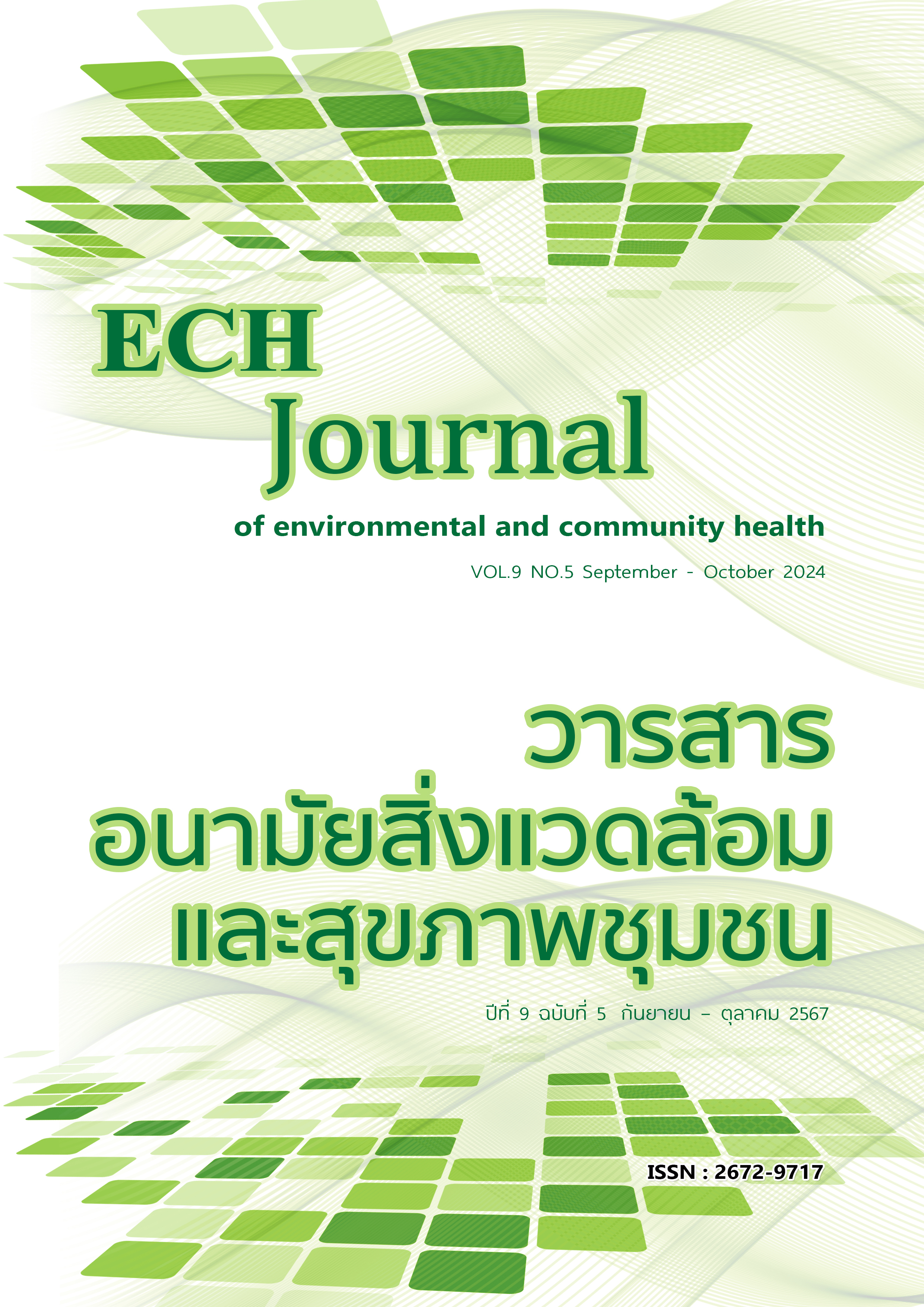การพัฒนารูปแบบการจัดการรายกรณี CKD3 Corner ของผู้ป่วยเบาหวานที่มีภาวะ ไตเสื่อมระยะที่ 3 โรงพยาบาลเกษตรวิสัย จังหวัดร้อยเอ็ด
คำสำคัญ:
ผู้ป่วยเบาหวานที่มีภาวะไตเสื่อมระยะ 3, การจัดการรายกรณีบทคัดย่อ
การวิจัยและพัฒนา (Research and Development) มีวัตถุประสงค์เพื่อศึกษาสถานการณ์ ปัญหาเกี่ยวกับผู้ป่วยเบาหวานที่มีภาวะไตเสื่อมระยะที่ 3 พัฒนารูปแบบการจัดการรายกรณี และศึกษาผลลัพธ์ด้านการพยาบาลและผลลัพธ์ทางคลินิกของผู้ป่วย จากการพัฒนารูปแบบการจัดการรายกรณี CKD3 Corner โรงพยาบาลเกษตรวิสัย จังหวัดร้อยเอ็ด ดำเนินการวิจัยและพัฒนาระหว่าง เดือน ตุลาคม 2565 - กันยายน 2566 กลุ่มผู้ร่วมวิจัย คือบุคลากรที่ปฏิบัติงานในงานผู้ป่วยนอกและคลินิคโรคเรื้อรัง จำนวน 10 คน และผู้ป่วยเบาหวานที่มีภาวะไตเสื่อมระยะ 3 ที่มารับบริการช่วงดำเนินการพัฒนา จำนวน 20 คน คัดเลือกแบบเจาะจงตามเกณฑ์การคัดเลือก เครื่องมือวิจัย ประกอบด้วย แนวทางการสัมภาษณ์เชิงลึกและการสนทนากลุ่ม แบบสอบถามข้อมูทั่วไป และแบบบันทึกข้อมูลทางคลินิกจากเวชระเบียน วิเคราะห์ข้อมูลด้วยสถิติพรรณนา สถิติ Paired t-test และการวิเคราะห์เนื้อหา
ผลการวิจัยพบ่วา หลังดำเนินการเกิดแนวทางการดูแลและส่งเสริมให้ผู้ป่วยจัดการตนเองอย่างเหมาะสม และการพัฒนารูปแบบการจัดการรายกรณีสำหรับผู้ป่วยเบาหวานที่มีภาวะไตเสื่อมระยะที่ 3 ส่งผลดีต่อผลลัพธ์ทางคลินิกในผู้ป่วยและความพึงพอใจของผู้เกี่ยวข้อง ผลการศึกษาพบว่าหลังดำเนินการ ผู้ป่วยมีผลลัพธ์ทางสุขภาพที่ดีขึ้นอย่างมีนัยสำคัญทางสถิติในหลายด้าน ได้แก่ ระดับ HbA1c ลดลง (p=0.048), อัตราการกรองของไตเพิ่มขึ้น (p<0.001), ความดันโลหิตลดลง (p<0.001), ดัชนีมวลกายลดลง (p=0.031), การเกิดภาวะน้ำตาลในเลือดต่ำลดลง (p=0.042) และการเข้ารับการรักษาในโรงพยาบาลลดลง (p<0.001) และหลังดำเนินการผู้ป่วยไม่มีอุบัติการณ์ณ์ของการเกิดแผลที่เท้า
เอกสารอ้างอิง
Al-Chalabi, S., Sinha, S., & Kalra, P. A. (2024). Enhancing clinical service design for multimorbidity management: A comprehensive approach to joined-up care for diabetes, chronic kidney disease, and heart failure. Diabetic medicine : a journal of the British Diabetic Association, e15403. Advance online publication. https://doi.org/10.1111/dme.15403
กมลทิพย์ วิจิตรสุนทรกุล, ศศิธร ตั้งสวัสด, นิพา ศรีช้าง. (2020). การเฝ้าระวังโรคเบาหวาน: ผลการสำรวจพฤติกรรมเสี่ยง โรคไม่ติดต่อและการบาดเจ็บ พ.ศ. 2561. วารสารวิชาการสาธารณสุข, 29(6): 967-975.
Wongsaroj, K. (2020). The Development of a Disease Is Not Contagious in Thailand. International Journal of Science and Society, 2(4), 180-193. https://doi.org/10.54783/ijsoc.v2i4.203
Levengood, T. W., Peng, Y., Xiong, K. Z., Song, Z., Elder, R., Ali, M. K., Chin, M. H., Allweiss, P., Hunter, C. M., Becenti, A., & Community Preventive Services Task Force (2019). Team-Based Care to Improve Diabetes Management: A Community Guide Meta-analysis. American journal of preventive medicine, 57(1), e17–e26. https://doi.org/10.1016/j.amepre.2019.02.005
Timpel, P., Lang, C., Wens, J., Contel, J. C., Schwarz, P. E. H., & MANAGE CARE Study Group (2020). The Manage Care Model - Developing an Evidence-Based and Expert-Driven Chronic Care Management Model for Patients with Diabetes. International journal of integrated care, 20(2), 2. https://doi.org/10.5334/ijic.4646
Gatlin, B., Miller, J., & Chang, S. (2024). Optimizing Collaborative Care of Patients with Chronic Kidney Disease Associated with Type 2 Diabetes: An Example Practice Model at a Health Care Practice in Kentucky, United States. Diabetes therapy : research, treatment and education of diabetes and related disorders, 15(1), 1–11. https://doi.org/10.1007/s13300-023-01500-7
Lin, C. C., & Hwang, S. J. (2020). Patient-Centered Self-Management in Patients with Chronic Kidney Disease: Challenges and Implications. International journal of environmental research and public health, 17(24), 9443. https://doi.org/10.3390/ijerph17249443
Krist, A. H., Tong, S. T., Aycock, R. A., & Longo, D. R. (2017). Engaging Patients in Decision-Making and Behavior Change to Promote Prevention. Studies in health technology and informatics, 240, 284–302.
Bourbeau, J. (2020). Defining Patient Engagement, Health Behavior Change, and Disease Self-Management. In: Moy, M., Blackstock, F., Nici, L. (eds) Enhancing Patient Engagement in Pulmonary Healthcare. Respiratory Medicine. Humana, Cham. https://doi.org/10.1007/978-3-030-44889-9_1
Papermaster, A. E., Whitney, M., & Vinas, E. K. (2023). Interprofessional Case Conference Enhances Group Learning and the Quality, Safety, Value, and Equity of Team-Based Care. The Journal of continuing education in the health professions, 43(1), 4–11. https://doi.org/10.1097/CEH.0000000000000485
Goh, L. H., Siah, C. J. R., Tam, W. W. S., Tai, E. S., & Young, D. Y. L. (2022). Effectiveness of the chronic care model for adults with type 2 diabetes in primary care: a systematic review and meta-analysis. Systematic reviews, 11(1), 273. https://doi.org/10.1186/s13643-022-02117-w
Joo, J. Y., & Huber, D. L. (2012). An integrative review of case management for diabetes. Professional case management, 17(2), 72–85. https://doi.org/10.1097/NCM.0b013e318243d473
Mattathil R. (2023). Hypoglycemia Management Using a Bundled Care Approach: A Quality Improvement Project. Journal of nursing care quality, 38(2), 141–145. https://doi.org/10.1097/NCQ.0000000000000670
Hyun, M. K., Lee, J. W., & Ko, S. H. (2023). Chronic disease management program applied to type 2 diabetes patients and prevention of diabetic complications: a retrospective cohort study using nationwide data. BMC public health, 23(1), 928. https://doi.org/10.1186/s12889-023-15763-z





